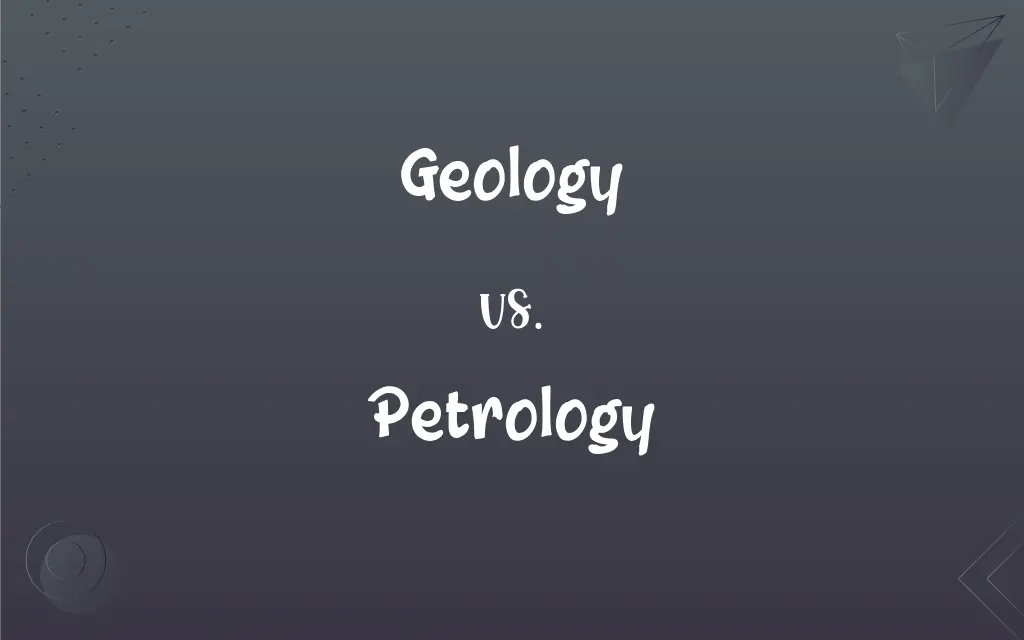Geology vs. Petrology: What's the Difference?
Edited by Aimie Carlson || By Harlon Moss || Published on February 13, 2024
Geology is the study of the Earth, its materials, and processes, while petrology is a branch of geology focusing on the study of rocks and their origins.

Key Differences
Geology is a broad field that encompasses the study of the Earth's physical structure, substances, history, and processes. Petrology, a specialized branch of geology, specifically focuses on the study of rocks, including their formation, composition, and classification. Both geology and petrology contribute to our understanding of the Earth, but petrology delves deeper into the detailed analysis of rocks.
In geology, scientists explore a wide range of topics, including plate tectonics, mineral resources, and the Earth's evolution. Petrology narrows this focus to the microscopic and chemical analysis of rocks, examining their origins and transformations. Geologists may use petrology to interpret rock formations, but petrologists concentrate on the specifics of rock types and their formation processes.
Geology often involves fieldwork, studying landforms, and collecting geological samples. Petrology heavily relies on laboratory analysis, using tools like microscopes and spectrometers to analyze rock samples. While geology covers a diverse range of geological phenomena, petrology provides detailed insights into the mineralogical and textural aspects of rocks.
Geology encompasses studying fossils and ancient life forms to understand Earth's history. Petrology, however, is more concerned with the current state and composition of rocks, rather than their historical context. Both disciplines, though, contribute to our knowledge of Earth's past, present, and future, with geology providing the broader context and petrology offering detailed rock-specific information.
Geologists may study natural hazards like earthquakes and volcanoes, understanding their impact on the environment and human society. Petrologists, while also interested in volcanic rocks, focus on the intrinsic properties of these rocks, such as texture and mineral content. Geology and petrology, therefore, offer complementary perspectives on Earth sciences, with geology providing a holistic view and petrology offering specialized knowledge about rocks.
ADVERTISEMENT
Comparison Chart
Scope
Study of the Earth, its materials, processes, and history
Study of rocks, their composition, and formation
Focus
Broad, encompassing various Earth processes
Narrow, focusing on rock analysis
Methods
Fieldwork, studying landforms, fossils
Laboratory analysis, microscopic and chemical examination
Application
Understanding natural resources, hazards
Detailed study of rock types, their properties
Contribution
Broad understanding of Earth's structure and history
Specific insights into mineralogy and texture of rocks
ADVERTISEMENT
Geology and Petrology Definitions
Geology
Geology includes studying the history of the Earth through fossils.
Geology has revealed much about the Earth's past life forms.
Petrology
Petrology uses microscopic analysis to understand rock properties.
The petrology lab is equipped with advanced microscopes for rock examination.
Geology
Geology examines natural hazards and their impact on the environment.
Her research in geology focuses on predicting and mitigating earthquake damage.
Petrology
Petrology examines the origin and transformation of rocks.
Through petrology, we can trace the history of a rock's formation.
Geology
Geology involves the analysis of Earth's materials, like minerals and rocks.
In geology class, we examined various minerals under a microscope.
Petrology
Petrology focuses on the mineral content and texture of rocks.
Petrology helps in identifying rocks by analyzing their mineral makeup.
Geology
Geology is the science of the Earth's physical structure and substances.
The geology course covered the formation of mountains and valleys.
Petrology
Petrology contributes to understanding Earth's crust and mantle composition.
Petrology provides insights into the materials composing the Earth's interior.
Geology
Geology studies the processes that shape the Earth's surface.
He studied geology to understand how volcanoes and earthquakes occur.
Petrology
Petrology is the branch of geology that studies the composition and formation of rocks.
In petrology, we learned about the different types of igneous rocks.
Geology
The scientific study of the origin, history, and structure of the earth.
Petrology
The branch of geology that deals with the origin, composition, structure, and alteration of rocks.
Geology
The structure of a specific region of the earth's crust.
Petrology
(geology) The study of the origin, composition and structure of rock.
Geology
A book on geology.
Petrology
The department of science which is concerned with the mineralogical and chemical composition of rocks, and with their classification: lithology.
Geology
The scientific study of the origin, history, and structure of the solid matter of a celestial body.
Petrology
A treatise on petrology.
Geology
The science that studies the structure of the earth (or other planets), together with its origin and development, especially by examination of its rocks.
Petrology
The branch of geology that studies rocks: their origin and formation and composition
Geology
The geological structure of a region.
The geology of the Alps.
Geology
The science which treats: (a) Of the structure and mineral constitution of the globe; structural geology. (b) Of its history as regards rocks, minerals, rivers, valleys, mountains, climates, life, etc.; historical geology. (c) Of the causes and methods by which its structure, features, changes, and conditions have been produced; dynamical geology. See Chart of The Geological Series.
Geology
A treatise on the science.
Geology
A science that deals with the history of the earth as recorded in rocks
FAQs
What is geology?
Geology is the science that studies the Earth, its materials, processes, and history.
Can geology help predict natural disasters?
Yes, geology plays a key role in understanding and predicting natural disasters like earthquakes.
Does petrology involve fieldwork?
While petrology can involve fieldwork, it primarily focuses on laboratory analysis.
What tools do petrologists use?
Petrologists use microscopes and spectrometers for rock analysis.
Are fossils studied in geology?
Yes, fossils are an important part of geology for studying Earth's history.
How do geology and petrology differ in focus?
Geology has a broader focus, while petrology specifically concentrates on rocks.
What role does geology play in environmental studies?
Geology is crucial for understanding Earth's processes and their impact on the environment.
How does petrology contribute to mining?
Petrology helps in identifying and analyzing mineral deposits for mining.
What is petrology?
Petrology is a specialized branch of geology focusing on the study of rocks.
Do petrologists study sedimentary rocks?
Yes, petrologists study all rock types, including sedimentary rocks.
How does geology relate to oil and gas exploration?
Geology is vital in locating and extracting oil and gas reserves.
Can geology help in construction projects?
Yes, geology is essential in assessing ground conditions for construction.
How does petrology relate to gemstone analysis?
Petrology aids in the analysis and classification of gemstones.
Does petrology study volcanic rocks?
Yes, petrology includes the study of volcanic rocks and their properties.
What is a mineralogical study in petrology?
It involves analyzing the mineral composition of rocks.
How do geologists use mapping?
Geologists use mapping to study landforms and geological features.
Is petrology involved in studying the Earth's interior?
Yes, petrology provides insights into the composition of the Earth's interior.
What is the role of geology in studying climate change?
Geology helps understand past climate patterns and their effects on Earth.
What is the importance of plate tectonics in geology?
Plate tectonics is a central concept in geology, explaining Earth's surface dynamics.
Are rock textures important in petrology?
Yes, rock textures are a key focus in petrology for understanding rock formation.
About Author
Written by
Harlon MossHarlon is a seasoned quality moderator and accomplished content writer for Difference Wiki. An alumnus of the prestigious University of California, he earned his degree in Computer Science. Leveraging his academic background, Harlon brings a meticulous and informed perspective to his work, ensuring content accuracy and excellence.
Edited by
Aimie CarlsonAimie Carlson, holding a master's degree in English literature, is a fervent English language enthusiast. She lends her writing talents to Difference Wiki, a prominent website that specializes in comparisons, offering readers insightful analyses that both captivate and inform.































































